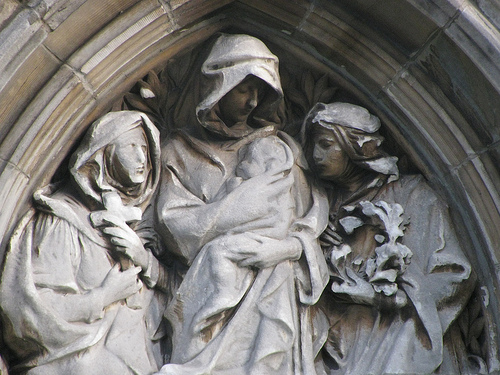We run our website the way we wished the whole internet worked: we provide high quality original content with no ads. We are funded solely by your direct support. Please consider supporting this project.

The Cross in the Manger, Part 2
While some shepherds were tending their flock, an angel appeared to them announcing “good news that will cause great joy for all the people,” for it news about “a Savior…the Messiah, the Lord” (Lk 2:10-11). Most Jews of this time expected a Messiah who would save them by vanquishing their Roman oppressors and liberating Israel to once again be a sovereign nation, as it was under the mighty king David. But, as we know, the way Jesus, the true Messiah, ended up being a “Savior” was not by taking anyone’s life, but by offering up his life. And in doing this, Jesus radically redefined the traditional understand of “Messiah” and “Savior” as well as the “good news” – the “Gospel” – that the Messiah brings.
This is why we must never separate Jesus’ birth, or any other aspect of Jesus’ life, from the self-sacrificial love of God that he most perfectly revealed on Calvary. To the contrary, this self-sacrificial love is the thematic thread that weaves together everything Jesus was about.
No one grasped the thematic centrality of the cross better than Paul. So thoroughly does the cross define the Gospel for Paul that he sometimes uses “the Gospel” and “the message of the cross” as synonyms (1 Cor 1:17-18, 23)! So, to be an enemy of the Gospel of Christ is to simply be an enemy “of the cross” (Phil 3:18). So completely does the crucified Christ define “the Gospel” for Paul that he could tell the Corinthians that he “resolved to know nothing while I was with you except Jesus Christ and him crucified” (1 Cor 2:2). This remarkable statement presupposes that everything we need to know about the Gospel is found in the cross.
This centrality of the cross for Paul is also reflected in his declaration that the cross is the means by which God’s love is most perfectly displayed (Rom 5:8; Eph 5:1-2) as well as the means by which the powers of evil are defeated (1 Cor 2:6-8; Col 2:14-5). It is also the means by which sin is atoned for (Eph 1:7), people are reconciled to God and to each other (Rom 5:10), and people are made righteous, healed, and empowered to live for God (Rom 5:15-19).
Yet, what is, in my opinion, the most astounding confirmation of the central importance of the cross for Paul is found in his teaching that, while unbelievers view it as foolish and weak, to those of us who are “being saved,” the cross it is both “the power” and “wisdom of God” (1 Cor 1:18, 24). In sharp contrast to the controlling power that humans have always lusted after, and thus that they have always ascribed to God or the gods, Paul defines God’s omnipotent power as his willingness to be crucified at the hands of enemies, out of love for enemies! He is saying that, when God puts his omnipotence most perfectly on display, it does not look like Zeus vanquishing foes: It rather looks like God offering up his life out of love for foes.
Which means, if your conception of God’s power doesn’t strike people’s common sense as “weak” and “foolish,” you’ve got a misconception of God’s power, according to Paul.
A cross-centered conception of God’s power understands that it is synonymous with God’s foolish-looking, humble, self-sacrificial love. And it is this same power, and this same love, that we begin to glimpse on that first Christmas morning, when God humbly set his divine prerogatives aside to become a weak, vulnerable baby.
The helpless baby we celebrate on Christmas became the helpless crucified criminal on Calvary, and it’s the self-sacrificial love of God that connects the two and everything in-between.
So as we celebrate the birth of Christ this Christmas, I trust we can discern a beautiful harbinger of the cross in the little child wrapped in swaddling clothes and lying in the manger. I trust we can understand how the foolishness of God becoming that vulnerable little baby is culminated in the foolishness of God becoming that crucified criminal. And I trust we can understand that both reveal the self-sacrificial omnipotent love of the one true God.
Folks, have a blessed Christmas!
Photo Credit: edenpictures via Flickr
Category: General
Tags: Christmas, Cross, Jesus, Power, Upside-Down Kingdom
Topics: Christology
Related Reading

Benefit of the Doubt Is Here!
Benefit of the Doubt is finally here and you should definitely get yourself a copy! Frank Viola interviewed Greg about the book recently and you can read it over on Frank’s blog Beyond Evangelical. In fact, Frank is so enthusiastic about the book that he added it to his Best 100 Christian Books Ever Written list. Wow. Also,…

Loving a Twilight Zone God?
David D. Flowers posted this insightful reflection over on his blog about an episode of The Twilight Zone and what it says about some pop views of God. Can we really love a God that exercises this kind of random control just because he can? We can certainly fear a God like this, but can…

10 Problems with the Penal Substitution View of the Atonement
If asked what Jesus came to do and how he did it, most contemporary Western Christians would automatically say something like, “Jesus took the punishment from God that I deserved.” This is what’s usually called the “Penal Substitution” view of the atonement, for it emphasizes that Jesus was punished by God in our place. His…

A Book That Won’t Leave You Unchanged
St. Ignatius of Loyola, the 16th century founder of the Jesuits, taught that to experience the transforming power of Scripture, we need to read it “with all five senses,” using our imagination to get on the inside of the characters and story we’re reading about. A just-released book by Frank Viola and MaryDeMuth entitled “The…

Are You Guilty of Marcionism?
Greg responds to the question of whether or not his cruciform hermeneutic is anything like the heresy of Marcion, who basically advocated throwing out the Old Testament. (Spoiler: it’s not.)

Conflicting Pictures of God
In my ongoing reflections on the ReKnew Manifesto, I’ve spent the last two posts (here and here) arguing that nothing is more important in our life than our mental images of God. If so, then the all-important question is: what authority do we trust to tell us what God is like? To most evangelicals, the…
